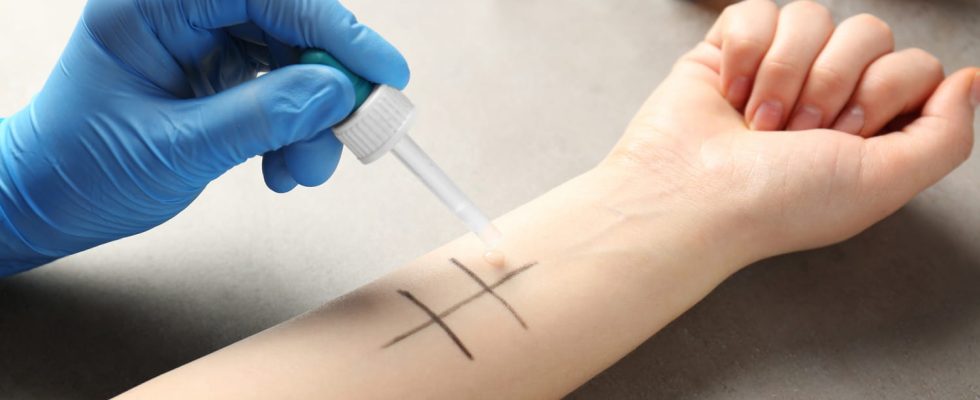The opinion of an allergist is essential in the face of signs evoking an allergy. Why go see him? Can we go without a prescription? How is an appointment? What is the price of a consultation?
An allergist is a doctor specializing in the treatment of allergies, whether cutaneous, respiratory, food or medicinal. Why go to an allergist? How is the first appointment with the allergist? What test does an allergist do? Is the allergist reimbursed by social security? Learn all about this healthcare professional.
Why go to an allergist?
One can consult an allergist in front of signs which evoke an allergy. It is recommended to consult this specialist in case of food allergies (with peanuts, milk, wheat, seafood, etc.), respiratory (pollen, mites, animal hair, etc.), cutaneous (urticaria, etc.), but also insects, medicines, latex… It is also your privileged interlocutor in case of asthma, severe eczema, recurrent conjunctivitis, repeated cough, reactions to certain medications or after insect bites. To make the diagnosis of allergy, the allergist proceeds to a “interrogation, the examination of the patient and on a bundle of concordant arguments, explains Dr. Madeleine Epstein, an allergist in Paris. Sometimes it is necessary to resort to provocation tests to confirm the diagnosis. Blood tests may also be done.
Can you go see an allergist without a prescription?
To be reimbursed, you need a prescription from your GP. It is always possible to consult an allergist without a prescription but the reimbursement will not be the same.
What is the difference with a pneumo-allergist?
“The pulmonologist-allergist is a specialist in pulmonology who is over-specialized in allergology. Most of the time he only treats respiratory allergies”says Dr. Epstein.
What is the difference with a dermatologist-allergist?
The dermatologist-allergist is a specialist in dermatology who is over-specialized in allergology. Most of the time it only supports skin allergies.
• The interrogation
The interrogation is a fundamental step in the first consultation. It allows you to find the reasons for the consultation, the family history of allergies (parents, uncles, aunts, cousins, etc.), the personal history of other allergies, or other illnesses. This is an opportunity to discuss the precise description of the allergic manifestations, from the first symptoms to the day of the consultation. The interrogation is rigorous and meticulous: he is moreover often described as a policeman. Everything is scrutinized: the time of appearance of the problem (place, season, weather, week, weekend, etc.), the influence of holidays and weekends leading to a probability of a professional cause, the climate, the unity of place, the lifestyle, the environment and the habits of the allergic person, the habitat (the allergist is interested for example in knowing if there are feathers in the pillow and the duvet, carpeting, wall hangings, knowing the temperature of the room and the nature of the heating, the presence of animals or plants, etc. as well as the factors of improvement or aggravation. “Sometimes, depending on the reason for the consultation, the practitioner will also want to know your professional or private trips, hobbies, diets and eating habits as well as the effectiveness of the anti-allergic treatments previously prescribed”. says Dr. Epstein. A first list of allergens that may be involved is established at the end of the consultation.
• Skin tests
In addition to the interview, skin allergy tests (prick-test) are the basis of the allergy investigation. Most often, they confirm the diagnosis of allergies to airborne allergens made by questioning. It consists of reproducing the allergic reaction on the skin. Concretely, a drop of each suspect allergen is deposited on the forearm or the back and the doctor makes it penetrate using a small needle. 10-20 minutes later, if the area is red or swollen, it means the patient is sensitive to it. Contrary to popular belief, these tests can be performed on young children.
• Other examinations
Oral, nasal or bronchial provocation tests are sometimes used when the diagnosis is difficult to establish. A chest and sinus X-ray is helpful. If in the vast majority of cases, one or two consultations are enough to identify the cause of the problem (especially in the case of food allergies), in some cases, it is necessary to search for many months.
“For skin problems, it is advisable to bring your medication prescriptions, the list of creams you usually use and, if possible, to bring the products you suspect you are allergic to”, says our expert. Also remember to make a list of medications taken regularly.
How much does a consultation with an allergist cost? Is it reimbursed?
For a simple consultationif the allergist consulted is approved for sector 1, his fee is 30 €. Social Security reimburses the consultation up to 70% of the contract price. If it is of sector 2, his fees are free. Health Insurance then reimburses up to 70% of the convention rate, which amounts to 23 €. If the patient is referred by his attending physician for a one-time consultant’s opinion, it is 50 €if the specialist is in sector 1. Reimbursement is 70%.
What studies to become an allergist?
Medical students benefit from a specific diploma course (a DES in allergology) in 4 years, at the end of the internship.
Thanks to Dr Madeleine Epstein, allergist in Paris.
